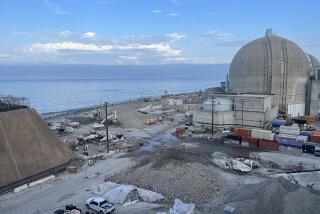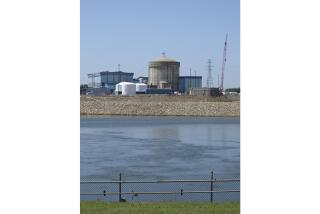2 Reports Cite Problems in Washington’s 23-Year-Old Hanford Reactor
- Share via
RICHLAND, Wash. — The federal government’s nuclear reactor here may experience severe cooling problems and possibly even a meltdown unless measures are taken to upgrade safety features and critical parts that are wearing out at the 23-year-old, weapons-producing plant, according to two Department of Energy reports.
The warnings of potential problems at the Hanford Government Reservation facility surfaced Thursday as concern grew over the safety of several U.S. nuclear plants that, like the Chernobyl facility in the Soviet Union, do not have containment structures to prevent the release of radioactivity.
The Hanford plant, about 35 miles from here, is further similar to the Chernobyl plant in that it also uses graphite as a moderating agent to control the rate of nuclear reaction. The so-called “N reactor,” owned by the Energy Department, also generates electricity. It is operated by United Nuclear Industries Inc.
As recently as Wednesday, Energy Department officials were assuring reporters that the reactor is safe.
One of the reports, by United Nuclear Industries and dated April 26, 1985, said that “serious deterioration” of the valve discs in the reactor’s primary cooling system could impair the flow of coolant because of difficulty in opening and closing them.
A breakdown in any reactor’s cooling system can be a precursor to a serious nuclear accident. Indeed, many Western nuclear experts have surmised that it was a failure in the coolant system that triggered the Chernobyl accident.
The United Nuclear Industries report also said that valves could break off and partially obstruct the cooling pipes. “The implications of partial flow channel blockage due to disc failure have been assessed and found to include some possible fuel damage,” the report said.
“Disc failure is, therefore, a risk which must be avoided to assure nuclear safety and reactor production continuity,” the report said. Larry P. Leach, vice president of United Nuclear’s operations division, said Thursday that the disc valves will be replaced beginning in fiscal year 1988, at a cost of $17 million, even though the valves are not expected to become seriously eroded until 1990.
The second document, this one warning of a possible meltdown in the event of a major earthquake, was in the Energy Department’s 1987 budget request. A meltdown occurs when the reactor’s temperature runs out of control, causing the fuel to melt and resulting in release of radioactivity.
A notation in an item requesting $800,000 to add braces to pipes used in the Hanford plant’s graphite cooling system said, “This project will assure emergency core cooling,” particularly in the event of an earthquake in which cooling water may not be available, thus “increasing the potential for core meltdown.”
But Energy Department officials here released a statement Thursday declaring that the $800,000 has been deleted from the department’s 1988 budget request and that earthquake safety improvements to the graphite cooling system are no longer under consideration.
They pointed out that the Hanford plant has two other systems which cool the reactor core and that both are designed to withstand an earthquake registering 8 on the Richter scale.
“There’s nothing wrong with the safety systems in N reactor as it is. . . ,” said Rodney Nelson, chief of the Energy Department’s reactor operating branch.
“I think the wording in the budget backup submittal may have been a little bit too graphic, to put it bluntly,” Nelson said in an interview.
Earlier this week, Michael J. Lawrence, manager of all Energy Department operations in the Hanford reservation area, noted that the facility has an unblemished record for all 23 years, and added, “We’re going to continue to operate just the way we have.”
Also on Wednesday, the Department of Energy announced that it is changing the dates of a detailed inspection of the reactor. The inspection, originally scheduled for next September, will begin as early as next week. Meanwhile, Rep. James Weaver (D-Oregon) said Thursday that his House subcommittee would hold hearings on the safety of the Hanford plant beginning May 16 in Portland. Weaver is chairman of a House Interior oversight subcommittee which held hearings after the accident at the Three Mile Island nuclear power plant in 1979.
Dan Meek, a consultant to the subcommittee, noted that the Department of Energy’s nuclear reactors are not regulated by the Nuclear Regulatory Commission, as are commercial power reactors.
“We don’t know if they are concerned about safety as opposed to having it done cheaply and quickly,” Meek said.
More to Read
Sign up for Essential California
The most important California stories and recommendations in your inbox every morning.
You may occasionally receive promotional content from the Los Angeles Times.










